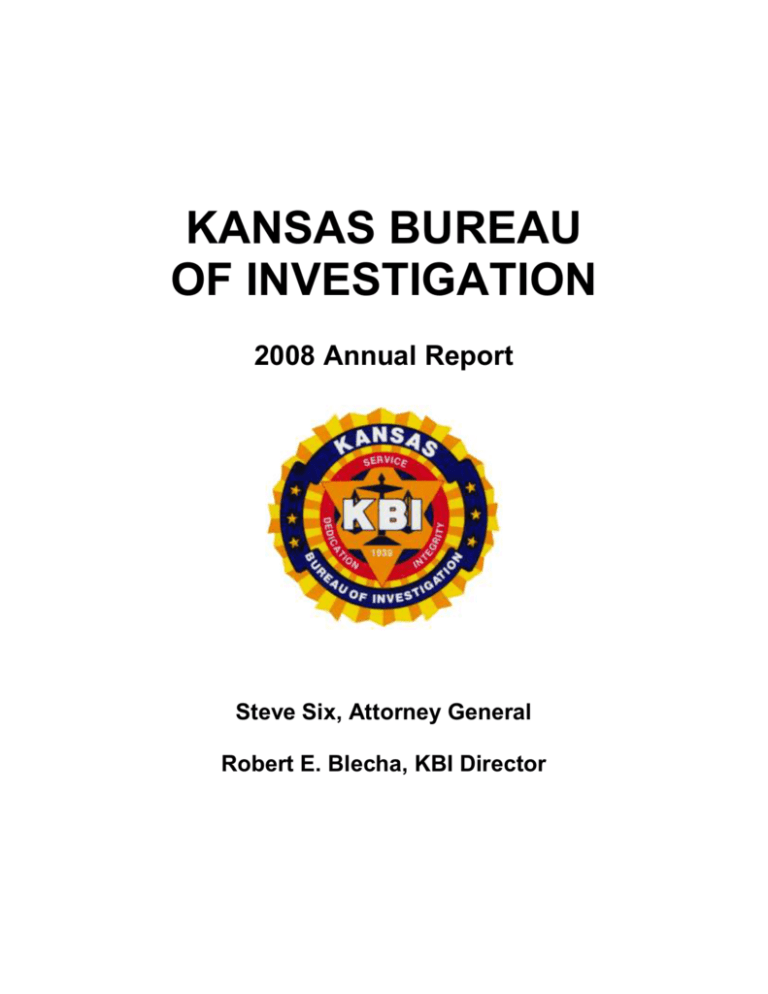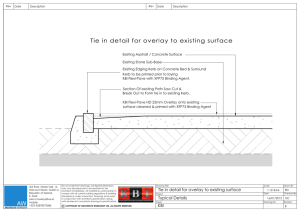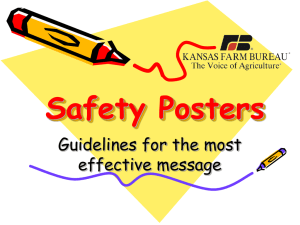INVESTIGATION DIVISION
advertisement

KANSAS BUREAU OF INVESTIGATION 2008 Annual Report Steve Six, Attorney General Robert E. Blecha, KBI Director Robert E. Blecha Director Stephen N. Six Attorney General February 26, 2009 Director’s Message: Please find attached our 2008 Annual Report and a summary of the meeting of the Kansas Bureau of Investigation Advisory Board. The Advisory Board met at the request of the KBI to discuss current operations and services provided by the KBI and a look into the future. The women and men of the KBI are very proud of their agency and are pleased to provide assistance to local law enforcement agencies and the citizens of the State of Kansas. Respectfully, Robert E. Blecha Director MISSION STATEMENT The Kansas Bureau of Investigation is dedicated to providing professional investigative and laboratory services to criminal justice agencies and the collection and dissemination of criminal justice information to public and private agencies, for the purpose of promoting public safety and the prevention of crime in Kansas. 1 INVESTIGATIONS DIVISION FIELD INVESTIGATIONS DIVISION The KBI Field Investigations Division provides expert criminal investigative services to local law enforcement agencies. This includes computer crimes, crimes against persons, crimes against property, economic/financial crimes, public corruption and specialized law enforcement situations. All agents process crime scenes, assisted by the forensic laboratory as needed. TRAINING UNIT The Training Unit trains law enforcement officers and promotes safety and awareness programs for citizens throughout the state, including Kansas’ Most Wanted. HIGH TECHNOLOGY CRIME UNIT (HTCU) The High Technology Crime Unit is a team of specially-trained agents focused on the criminal use of computers and technology. This unit provides forensic computer examination services, training and technical support to local agencies and prosecutors. HIGH RISK WARRANT TEAM (HRWT) The High Risk Warrant Team is a group of specially-selected, trained and equipped agents who provide tactical support in the service of high-risk search warrants, arrest warrants and in other potentially dangerous law enforcement operations throughout the state. SPECIAL OPERATIONS DIVISION This division is the narcotics enforcement arm of the KBI. In addition to traditional drug investigations, this division coordinates the state’s marijuana suppression/eradication program, the Clandestine Laboratory Response Team, the Asset Forfeiture Program and the High Intensity Drug Trafficking Area Program. The Special Operations Unit also participates in various federal drug task forces. 2 2008 INVESTIGATIONS FIELD INVESTIGATIONS DIVISION TYPE OF INVESTIGATION Death Rape Burglary Assault Sex Offense Larceny Fraudulent Activities & Embezzlement All Other TOTAL Person Crimes Property Crimes 2007 2008 82 (16 In-Custody) 69 (14 In-Custody) 108 16 38 54 47 21 114 73 28 41 53 41 15 104 480 424 359 121 323 101 2007 2008 56 75 63 28 6 97 (Does not include cases involving narcotics, backgrounds or confidential informants). BACKGROUND INVESTIGATIONS Gubernatorial KBI Other TOTAL 131 HIGH TECH CRIME INVESTIGATION UNIT REPORT TYPE OF INVESTIGATION Computer Related Cases Opened by KBI Agency Assist Without Opening a KBI Case Requests for Assistance Declined with Referral TOTAL 2007 2008 15 44 16 15 65 23 75 103 3 HIGH RISK WARRANT TEAM REPORT CALLS FOR SERVICE TOTAL Type of Incident: VIP Protective Detail Violent Offender Protective Detail Search Warrant – Meth Distribution Arrest Warrant – Aggravated Assault Cocaine Cases 2007 2008 22 27 Buy – Bust Drug Operation Barricaded Subject – Aggravated Assault Hostage Situation – Aggravated Robbery Guns and Drugs SPECIAL OPERATIONS DIVISION NARCOTICS INVESTIGATIONS TYPE OF INVESTIGATION Heroin-Sell Opium or Deriv-Sell Cocaine-Sell Cocaine-Smuggle Cocaine-Possess Synth Narcotic-Possess Synth Narcotic-Sell Synth Narcotic Narcotic Equip-Possess Marijuana-Sell Marijuana-Smuggle Marijuana-Possess Marijuana-Producing Marijuana Methamphetamine-Manufacture Methamphetamine-Sell Methamphetamine-Possess Methamphetamine CLRT Clean-Up Request Dangerous Drugs Dangerous Drugs (assist) Hallucinogen – MFR Steroids TOTAL 2007 2008 0 1 58 1 3 0 5 0 1 38 7 15 23 2 43 97 10 0 5 19 0 0 0 328 0 0 105 1 6 2 12 1 0 52 3 23 20 1 73 64 19 1 5 14 7 1 3 413 4 FORENSIC LABORATORY DIVISION CHEMISTRY SECTION Analyzes controlled substances, clandestine laboratories, arson and paint evidence. BIOLOGY SECTION Examines evidence for body fluids and determines the source through DNA analysis, also maintains the DNA databank for forensic and arrestee samples. QUESTIONED DOCUMENT SECTION Compares handwriting samples from suspects to a questioned document to determine the identity and signature authenticity. Examines documents for alterations and sequence which may have been forged or altered. TOXICOLOGY SECTION Tests biological samples for the presence and levels of alcohol and/or drugs, assists the medical examiner in death investigations by identifying drugs, alcohol or poisons, such as carbon monoxide. LATENT PRINT SECTION Assists in most crime scene investigations by comparing and identifying latent fingerprints, footwear and tire tracks, and taking photographs. Maintains the Automated Fingerprint Identification System which identifies suspects to evidence and criminal acts. FIREARM AND TOOLMARK SECTION Examines, compares and identifies firearm and ammunition parts to weapons. Examines evidence for tool marks, clothing and other objects for muzzle distance and restores obliterated serial numbers. Maintains the Integrated Ballistic Identification System to link firearms to shootings. 5 2008 KBI LABORATORY REPORT TOPEKA LABORATORY Discipline Submissions Received Cases Completed Turnaround Time Backlog Biology Biology/DNA Chemistry Firearms / Toolmarks 1,049 549 183 days 775 339 323 199 days 714 3,341 3480 20 days 231 140 81 186 days Latent Prints Questioned Documents Toxicology 1,074 1279 164 days 57 36 7 days 34 3,035 3,694 58 days 981 84 Non-IBIS Cases 25 IBIS Cases 633 GREAT BEND LABORATORY Discipline Biology Biology/DNA Chemistry Latent Prints Submissions Received Cases Completed Turnaround Time Backlog 461 325 183 days 308 128 175 67 days 53 2,370 2,133 38 days 245 707 627 124 days 354 PITTSBURG LABORATORY Discipline Chemistry Latent Prints Submissions Received Cases Completed Turnaround Time Backlog 1,061 823 40 days 208 317 318 31 days 40 KANSAS CITY LABORATORY Discipline Submissions Received Cases Completed Turnaround Time Backlog Biology Biology/DNA Firearms / Toolmarks 161 74 162 days 152 14 38 126 days 36 255 143 213 days 87 Non-IBIS Cases 774 IBIS Cases LABORATORY TOTALS Laboratory Topeka Great Bend Pittsburg Kansas City Laboratory System Total Submissions Received Cases Completed 6,000 9442 3666 3260 1378 1141 430 255 11,474 14,098 6 INFORMATION SERVICES DIVISION The Information Services Division supports criminal justice activities at the local, state, and national level through the collection, management, and dissemination of criminal record information. Specific services of the Information Services Division include operation of the: Kansas Central Repository for criminal history records. State’s ten-print fingerprint identification services. Kansas Offender Registry. Kansas Incident-Based Reporting System (KIBRS). State’s Missing Persons’ Program Private Investigator Licensing Program STATISTIC SUMMARY 2007 2008 157,521 623,101 50,257 1,185,353 185,224 628,566 45,834 1,226,017 143,563 68,954 187,655 98,057 Offenders registered Total number of records in Offender Registry at year’s end 821 5,605 2,003 6,795 Missing persons records processed Private Investigator licenses issued or renewed 6,484 775 5,795 230 Fingerprint records processed Record checks conducted Criminal histories added to Central Repository Total number of criminal history records at year’s end Kansas Standard Offense Reports received Kansas Standard Arrest Reports received KANSAS BUREAU OF INVESTIGATION ADVISORY BOARD To assist with strategic planning for the agency, the Kansas Bureau of Investigation (KBI) requested assistance from the Kansas Sheriff’s Association (KSA), the Kansas Association of Chiefs of Police (KACP), and the Kansas County/District Attorneys Association (KCDAA) with the formation of an advisory board. The resulting advisory board was comprised of: Joseph F. Harkins, Commissioner (Advisory Board Chair) Kansas Corporation Commission Scott Holladay, Undersheriff Shawnee County Richard N. Raleigh Barber County Attorney 7 John R. Fletcher, Sheriff Russell County Jess Hoeme, Assistant District Attorney Shawnee County Randy J. Henderson, Sheriff Reno County Jan L. Satterfield Butler County Attorney B. Cole Presley, Sheriff Graham County Todd R. Ackerman, Chief Marysville Police Department James Braun, Chief Hays Police Department Jim Daily, Chief Newton Police Department Randy Wilson, Chief Mission Police Department Rick Guinn, Deputy Attorney General Kansas Attorney General The KBI requested the advisory board focus their collective efforts on the following three questions: 1. If the KBI were to expand services, what services should the KBI expand or improve? 2. If the KBI were to reduce services, what services could the KBI reduce with the least amount of harm to our customers? 3. If the KBI were to improve efficiencies, where could those be found? The advisory board met at the KBI headquarters in Topeka, Kansas on January 13, 2009 and January 14, 2009. KBI staff provided the advisory board with detailed information concerning KBI operations and services presently provided in order facilitate the board’s discussions. After meeting for two days, the board reached the following conclusions with regards to the three questions they had been asked to focus on: If the KBI were to expand services, what services should the KBI expand or improve? The board believed the forensic laboratory affects all of the criminal justice system and the turnaround time for examinations of evidence needs to be improved. The board felt the turnaround time should be 30 days for any requested exam and should not be allowed to exceed 4 months maximum. DNA testing currently has a backlog of 1350 cases and is the area most in need of improvement. The biology department is currently forced to be subpoena driven and non-subpoena cases often take 18 months for the evidence to be examined and results forwarded to the requesting agency. The board recognized the need for expansion of laboratory space and the fact it takes 2 years to train a forensic scientist, before much progress can be made with regards to reducing the backlog of cases. The board recommended a concerted effort to expand the collection of KBI laboratory fees which are assessed at the time of conviction. The $400 fee is believed to not always be assessed 8 by the courts and often it is not assessed “per count” as written in the statute. (KSA. 2007 Supp. 28-176) The KBI presently only receives approximately 24% of the fees payable for the testing being completed. If the remaining 74% of the outstanding fees were collected the money could be utilized to help reduce the backlog of cases. The board recommended a letter be sent to the courts requesting each court review their procedure for assessing and collecting the mandated laboratory fee. The board members were also going to request the members of their respective associations contact their prosecutors and local courts to express the importance of assessing and collecting the fees. The board recognized the importance of continual improvement to the Kansas Criminal Justice Information System (KCJIS). The board believes KCJIS requires a separate funding stream to continue operations and improve the system, which is maintained by the KBI but benefits the entire Kansas criminal justice community. The KBI should expand its ability to assist with white collar investigations, as crimes of this nature are increasing and few law enforcement agencies have the expertise to conduct this type of investigation. The federal government used to assist agencies with white collar investigations, but they have raised the threshold dollar amount so high it has left a large gap where federal assistance is not provided. If the KBI were to reduce services, what services could the KBI reduce with the least amount of harm to our customers? The board felt the KBI could not reduce any services without harming the criminal justice community. Marijuana Eradication was named as a program that could be cut without having any major effect on the criminal justice community. The board believed local agencies should handle Marijuana Eradication and this would allow agents to use their time to assist agencies in other areas. If the KBI were to improve efficiencies where could those be found? The board believed in order to help the laboratory reduce the backlog of cases, submission guidelines should be developed. Once guidelines were developed, the associations could be utilized to publish the guidelines to their members. Given the substantial backlog with regards to DNA testing, the board felt the laboratory should stop accepting property crime evidence for DNA testing. If an agency felt there was a need to test property crime evidence for DNA, they would have to use a private lab or if exigent circumstances existed they could obtain an exemption from the KBI lab director. The board felt the KBI could eventually be in a position to once again accept all evidence submitted for DNA testing, but for now reducing the number of evidence submissions would be a way to prioritize the efforts of the lab. The board recognized agencies will have a higher cost for testing by a private lab and there would be a social cost by not accepting property crime evidence for DNA testing, but believed the reduction in the backlog of violent crime cases would offset the negatives. 9 The board suggested the KBI look into combining resources when possible, such as the KBI’s High Risk Warrant Team (HRWT) and the Kansas Highway Patrol (KHP) tactical team. The KBI should provide greater investigative assistance to the smaller jurisdictions where resources are very limited. The metro areas of the state have greater resources and are in less need of assistance from the KBI. The KBI should try to partner with more local agencies for dealing with things like computer crimes. Several agencies have certified forensic computer examiners and it would help reduce the KBI case load while providing more experience to the local agency examiners. The KBI should review metro task force participation by KBI agents. The board recognized there are benefits to participating in metro task forces, but questioned if the benefits exceeded the cost. 10






